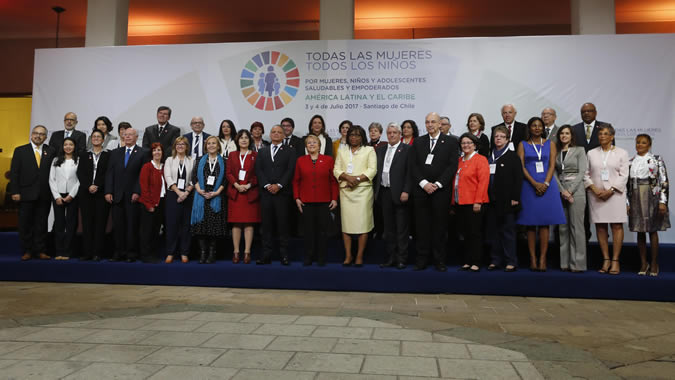Alicia Bárcena: Focus on gender and life cycle in public policy is crucial to guaranteeing the rights of women, children and adolescents
Work area(s)
ECLAC’s Executive Secretary participated in the high-level meeting of the United Nations initiative “Every Woman Every Child,” inaugurated by the President of Chile, Michelle Bachelet.

“A focus on gender and life cycle in public policy is crucial to give visibility to the needs and reverse the disadvantages faced by women, children and adolescents in Latin America and the Caribbean,” Alicia Bárcena, ECLAC’s Executive Secretary, said today at the first session of the high-level meeting, Every Woman Every Child, taking place in the Palacio La Moneda, the headquarters of Chile’s Executive Branch.
“Gender, age and ethnicity/race are the three determining factors in the distribution of well-being and power in society,” therefore “public policies must support people throughout the different stages of their lives in response to the specific risks and vulnerabilities of each person,” explained the highest representative of the Economic Commission for Latin America and the Caribbean (ECLAC).
The event was inaugurated by the President of Chile, Michelle Bachelet, in her capacity as co-Chair of the high-level advisory group for the EWEC (Every Woman Every Child) initiative, along with Ministers of Finance, Rodrigo Valdés; Health, Carmen Castillo; Education, Adriana Delpiano; Women and Gender Equity, Claudia Pascual; and Social Development, Marcos Barranza. High UN officials are attending, as well as representatives from the countries of Latin America and the Caribbean and international specialists.
The EWEC was launched by former UN Secretary-General, Ban Ki-Moon, in September 2010, for the purpose of mobilizing and intensifying national and international action by governments, multilateral organizations, the private sector and civil society around the principal health challenges faced by women, children and adolescents throughout the world.
“Today we have concrete evidence that actions in support of women, childhood and adolescence generate tremendously positive impacts” on society, stated the Chilean president at the event, whose aim is to discuss the implementation of the Global Strategy for Women’s, Children’s and Adolescents’ Health in the context of Latin America and the Caribbean (2016-2030) with a view toward achieving the Sustainable Development Goals (SDGs).
During her remarks, Alicia Bárcena presented key indicators on the issues of poverty, adolescent maternity, infant mortality, malnutrition, violence against women and school violence, among others, that make it possible to identify the main challenges yet to overcome.
“Poverty has the face of a woman in Latin America and the Caribbean,” she underscored, since women are overrepresented in the lower income quintiles. Likewise, “children and adolescents are more affected by indigence and poverty than persons from other age groups,” she added.
Bárcena also said that persistent maternal mortality for preventable reasons is probably one of the most revealing indicators of inequality and discrimination affecting Latin American and Caribbean women.
Furthermore, although infant mortality has significantly diminished in the past 10 years, it continues to be systematically higher among the indigenous and Afro-descendent populations, she emphasized.
ECLAC, in conjunction with the WFA (World Food Programme), have also calculated the total costs of the double burden of malnutrition (undernutrition and obesity) in three Latin American countries (2014). The figures amount to 493 million dollars in the case of Chile (0.2% of GNP), 4.344 billion dollars in Ecuador (4.3% of GNP) and 28.830 billion dollars in Mexico (2.3%), in health, education and productivity costs.
“Inequality is not inevitable,” summed up Bárcena, who advocated for a new development paradigm in Latin America and the Caribbean that combines social inclusion, environmental sustainability and economic dynamism.
In this framework, added the high official, ECLAC proposes building a new political compact that will allow us to transition from a culture of privilege – sustained through tax evasion, corruption and influence peddling – to a culture of equality.
It is essential, she said, that we have universal policies of health, education and the eradication of poverty, as well as systems of universal social protection, especially for childhood and adolescence, in addition to guaranteeing the three autonomies of women (physical, economic and political) and ending statistical silence in order to give visibility to the most vulnerable populations.
The Commitment to Action for implementing the Global Strategy for Women’s, Children’s and Adolescents’ Health will be presented at the meeting, which concludes on Tuesday, July 4.
Country(ies)
- Latin America and the Caribbean
Contact
Public Information Unit
- prensa@cepal.org
- (56 2) 2210 2040


